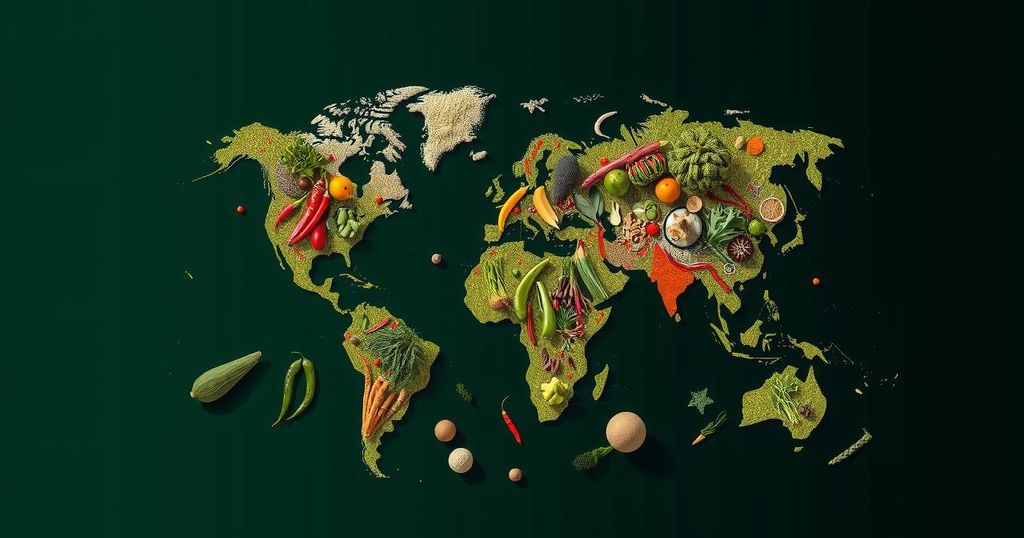A report from the Stockholm Environment Institute and Mistra Geopolitics warns that climate change and geopolitical tensions threaten global food security. To mitigate these risks, the report suggests that nations enhance domestic food production, adopt resilient agricultural practices, reduce food waste, and foster international cooperation. The authors emphasize the necessity of adaptable policies to safeguard food availability amidst escalating global conflicts and environmental impacts.
A recent report from the Stockholm Environment Institute and Mistra Geopolitics highlights that climate change, geopolitical tensions, and geoeconomic divisions significantly threaten global food security. Published at COP29’s Food, Agriculture and Water Day, the report emphasizes that to counter these risks, countries must bolster domestic food production, adopt resilient agricultural practices, minimize food waste, and foster international collaboration among nations with shared goals. The research points out the detrimental effects of climate change on agriculture, such as extreme weather events leading to cascading risks in food systems globally. With 59 active conflicts reported in 2023, geopolitical instability exacerbates food production challenges, deeply influencing food accessibility worldwide. Specifically, the interaction between climate risks and escalating geopolitical tensions—exemplified by Russia’s invasion of Ukraine—has disrupted international trade, further threatening food security. Lead author Sara Talebian notes, “Food trade is being used as a means of power (weaponized) in geopolitical conflicts. But collaboration among small groups of countries with common goals or shared risks emerges as a potential solution to manage climate risks to food security under increasing geopolitical tensions.” Climate impacts, such as flooding and droughts, disrupt global food supply chains, leading to price shocks and social unrest. Countries heavily reliant on imports from major agricultural producers face dire consequences when these producers experience climate-induced difficulties. For instance, flooding in Pakistan not only affects local populations but also disrupts rice supplies in the European Union, causing widespread implications. The report discloses alarming trends regarding hunger, with over 100 million additional individuals experiencing hunger in 2022 compared to 2019. Projections indicate that by 2030, approximately 582 million people, or 6.8% of the global population, may suffer from chronic undernutrition. Talebian advocates for strategies such as reducing food waste and shifting dietary preferences toward plant-based options to enhance food security across all nations. The study concludes that enhancing local capacities for climate-resilient agriculture is essential to reduce reliance on global markets and counteract climate risks. Effective, adaptable policy responses are necessary to manage climate-related food security challenges. By embracing multifaceted approaches—ranging from improved domestic food production to fostering transnational collaborations—nations can strengthen global food systems against the intensifying impacts of climate change and geopolitical turmoil.
The increasing occurrences of extreme weather events linked to climate change have profound consequences for agricultural productivity. This decline in food production is further exacerbated by geopolitical tensions and conflicts, which disrupt trade routes and commodity access, thereby threatening food security. As these challenges intensify, international cooperation and innovative solutions become imperative to ensure that populations worldwide have reliable access to food, regardless of shifting political climates.
In summary, the report underscores the urgent need for nations to address the multifaceted risks posed by climate change and geopolitical divisions to food security. By fostering collaboration among countries with shared challenges, enhancing local agricultural resilience, and adopting sustainable practices such as minimizing food waste, the global community can fortify food systems against future uncertainties and ensure food security for all.
Original Source: news.cision.com






